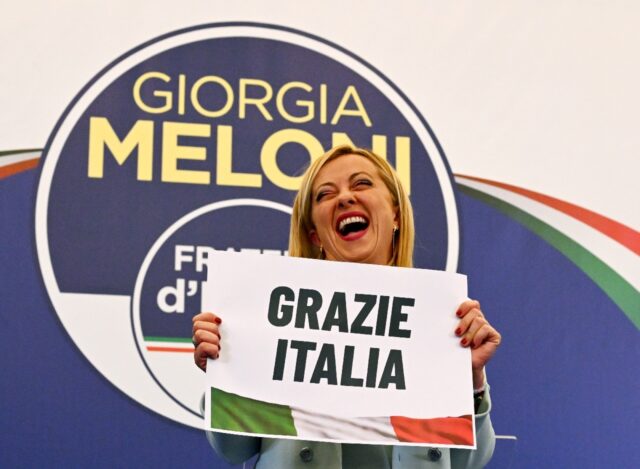Italian election winner Giorgia Meloni may at first glance have much in common with ultra-conservative governments in fellow EU nations Poland and Hungary, but experts say that when it comes to real-world policy any alliance could soon run into limits.
Reaction to Sunday’s strong result for Meloni’s Brothers of Italy party was muted from pillars of EU integration like Paris and Berlin, but Warsaw and Budapest were warm in their congratulations.
“We’ve never had greater need of friends sharing a vision of and a common approach to Europe,” the Hungarian government said, while from Poland came praise for Meloni’s “great victory”.
“Hungary and Poland are more than happy with this election, first because it relieves the pressure on their own countries in the EU, and second because it paves the way for a more united front,” said Yordan Bozhilov, director of the Bulgaria-based Sofia Security Forum think-tank.
The Italian election follows hard on the heels of a Swedish poll that also produced a surge for the extreme right.
But with the far right in power in one of the EU’s largest countries and founding members, Hungary and Poland could be far less isolated in their battles with Brussels over rule-of-law issues.
What’s more, Rome, Budapest and Warsaw are now set for alignment on social concerns, with anti-Islam, anti-abortion and anti-LGBT positions.
“Together we will defeat the cynical and pampered Eurocrats who are destroying the European Union, breaching treaties, destroying our civilisation and advancing the LGBT agenda!” Poland’s deputy agriculture minister Janusz Kowalski tweeted in a message congratulating Meloni on Monday.
Meloni also shares her prospective allies’ vision of a Christian, white Europe made up of sovereign nations.
“Hungary and Poland are countries that want to change the EU from within, and they don’t hide it. So far they haven’t succeeded, but there will definitely be an attempt to create a Rome-Budapest-Warsaw axis,” said Tara Varma, director of the Paris office of the European Council on Foreign Relations.
But such parties’ demands have already moderated in recent years from full exit from the EU, “given the absolute cautionary tale that Brexit has been,” she added.
Instead, the axis could become “spoilers, the sand in the gears” in Brussels.
“One step forward, two steps back, they could prevent the EU making progress while continuing to benefit from joint funds,” Varma said.
Splits over Russia
A front based on values could still founder when faced with today’s overriding concern of the war in Ukraine and EU relations with Russia.
While Meloni has so far matched Warsaw in declarations of support for Ukraine and for EU sanctions on Russia over its invasion of its neighbour, Hungary’s leader Viktor Orban — close to President Vladimir Putin — is opposed.
“At some point, Meloni will have to choose between Poland and Hungary,” Varma predicted.
The Brothers of Italy leader is not expected to bend her position to match those of her junior coalition partners, Silvio Berlusconi and Matteo Salvini, who are friendlier to Moscow.
“Regarding foreign policy, as far as we know Meloni backs the sanctions against Russia and Brothers of Italy is closer to Poland’s PiS (governing party) than Hungary’s Fidesz,” said Hungarian analyst Patrik Szicherle.
Meloni has “sent the right messages on Ukraine,” said Martin Quencez of the German Marshall Fund, pointing out Italy’s critical relationship with the US as a reliable NATO ally.
Once elected prime minister, she “has every incentive to have good relations with Brussels, not to enter a pitched battle,” said Paolo Modugno, professor of Italian civilisation at Paris’ Sciences Po university.
Meloni “is very aware of the Italian public’s problems, their fear of inflation and the economic situation. What’s urgent for her is to manage the crisis, not to take ideological risks,” he added.
Analysts suggest that the incoming government’s choice of top ministers, especially in the finance and foreign ministries, will clearly signal how Meloni plans to position herself in Europe.

COMMENTS
Please let us know if you're having issues with commenting.